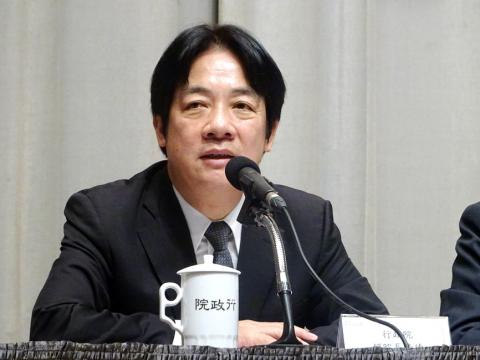The Cabinet yesterday approved proposed amendments to the Political Donations Act (政治獻金法) aimed at increasing the transparency of campaign financing and reducing the risk of illegal activities, the Executive Yuan said.
The drafts were approved at a meeting chaired by Premier William Lai (賴清德), who described them as an embodiment of the resolutions made by the National Congress on Judicial Reform.
If passed by the Legislative Yuan, the amendments would require that contributions to politicians from individual and corporate donors be made public through the Control Yuan’s Web site, Deputy Minister of the Interior Hua Ching-chun (花敬群) said.

Photo: Lee Hsin-fang, Taipei Times
The Political Donations Act requires the Control Yuan to publish online only a political campaign’s final accounts, whereas the proposal would require the publication of all 25 items in campaign finance reports, he said.
The amendments also stipulate that the Control Yuan publish the campaign finance reports of each politician in full, instead of just a portion of them, he said.
They would shift the period during which township mayoral candidates are permitted to receive political contributions to coincide with those of city and county councilor candidates, officials said.
City and county councilor candidates are allowed to receive donations starting from eight months before the current postholder’s tenure is expected to expire until the day before election day.
The amendments would also establish a legal framework for political contributions made to the campaigns of Aboriginal district administrators and city councilors in the six special municipalities, the premier said.
Clearer regulations would help protect the political rights of Aboriginal citizens and their elected representatives, he said.
The Ministry of the Interior has been told to help party caucuses facilitate the speedy passage of the bill through the legislature, he said.
The Executive Yuan is also considering drafting additional amendments that would legalize and regulate campaign contributions during recall elections as part of its next round of campaign finance law reforms, a Ministry of the Interior official said on condition of anonymity.

Tropical Storm Gaemi strengthened into a typhoon at 2pm yesterday, and could make landfall in Yilan County tomorrow, the Central Weather Administration (CWA) said yesterday. The agency was scheduled to issue a sea warning at 11:30pm yesterday, and could issue a land warning later today. Gaemi was moving north-northwest at 4kph, carrying maximum sustained winds near its center of up to 118.8kph and gusts of 154.8kph. The circumference is forecast to reach eastern Taiwan tomorrow morning, with the center making landfall in Yilan County later that night before departing from the north coast, CWA weather forecaster Kuan Shin-ping (官欣平) said yesterday. Uncertainty remains and

SEA WARNING LIKELY: The storm, named Gaemi, could become a moderate typhoon on Wednesday or Thursday, with the Taipei City Government preparing for flooding A tropical depression east of the Philippines developed into a tropical storm named Gaemi at 2pm yesterday, and was moving toward eastern Taiwan, the Central Weather Administration (CWA) said. Gaemi could begin to affect Taiwan proper on Tuesday, lasting until Friday, and could develop into a moderate typhoon on Wednesday or Thursday, it said. A sea warning for Gaemi could be issued as early as Tuesday morning, it added. Gaemi, the third tropical storm in the Pacific Ocean this typhoon season, is projected to begin moving northwest today, and be closest to Taiwan on Wednesday or Thursday, the agency said. Today, there would likely

DISRUPTIONS: The high-speed rail is to operate as normal, while several airlines either canceled flights or announced early departures or late arrivals Schools and offices in 15 cities and counties are to be closed today due to Typhoon Gaemi, local governments announced last night. The 15 are: Taipei, New Taipei City, Taoyuan, Tainan, Keelung, Hsinchu and Kaohsiung, as well as Yilan, Hualien, Hsinchu, Miaoli, Chiayi, Pingtung, Penghu and Lienchiang counties. People should brace for torrential rainfall brought by the storm, with its center forecast to make landfall on the east coast between tonight and tomorrow morning, the Central Weather Administration (CWA) said. The agency issued a sea warning for the typhoon at 11:30pm on Monday, followed by a land warning at 11:30am yesterday. As of

CASUALTY: A 70-year-old woman was killed by a falling tree in Kaohsiung as the premier warned all government agencies to remain on high alert for the next 24 hours Schools and offices nationwide are to be closed for a second day today as Typhoon Gaemi crosses over the nation, bringing torrential rain and whipping winds. Gaemi was forecast to make landfall late last night. From Tuesday night, its outer band brought substantial rainfall and strong winds to the nation. As of 6:15pm last night, the typhoon’s center was 20km southeast of Hualien County, Central Weather Administration (CWA) data showed. It was moving at 19kph and had a radius of 250km. As of 3pm yesterday, one woman had died, while 58 people were injured, the Central Emergency Operation Center said. The 70-year-old